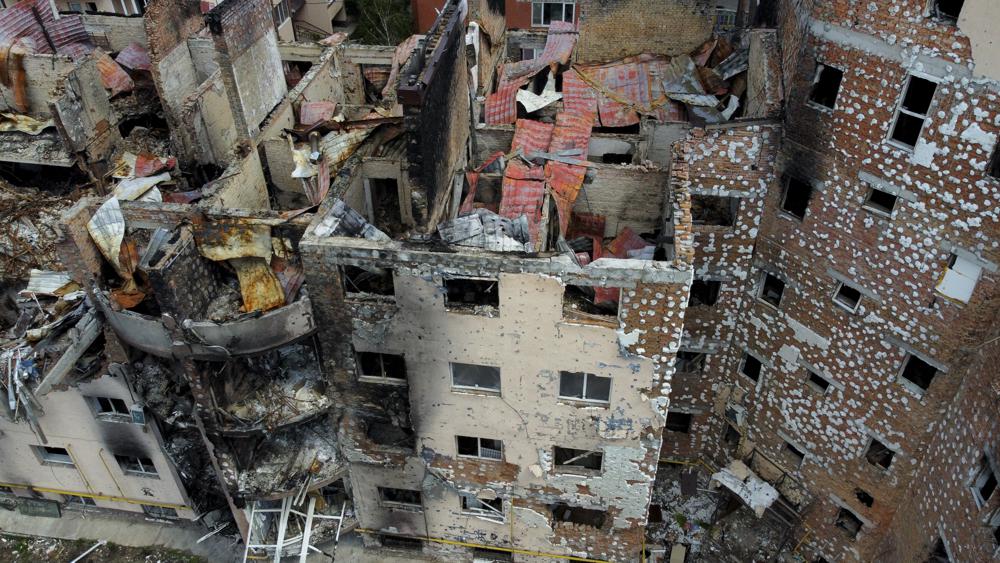Damaged buildings ruined by attacks are seen in Irpin, on the outskirts Kyiv, Ukraine, Thursday, May 26, 2022. (AP Photo/Natacha Pisarenko)
KYIV, Ukraine (AP) — Moscow pressed the West on Thursday to lift sanctions against Russia over the war in Ukraine, seeking to shift the blame for a growing food crisis worsened by Kyiv’s inability to ship millions of tons of grain and other agricultural products because of the conflict.
Britain immediately accused Moscow of “trying to hold the world to ransom” and insisted there would be no sanctions relief.
Ukraine is one of the world’s largest exporters of wheat, corn and sunflower oil, but the war, including a Russian blockade of its ports, has prevented much of that production from leaving the country, endangering the world food supply. Many of those ports are also now heavily mined.
Kremlin spokesman Dmitry Peskov tried to put the blame for the crisis squarely on Western sanctions.
“We accuse Western countries of taking a series of unlawful actions that has led to the blockade,” he said in a conference call with reporters.
Russia itself is also a significant exporter of grain, and Peskov said the West “must cancel the unlawful decisions that hamper chartering ships and exporting grain.”
His comments appeared to be an effort to deliberately muddy the waters, by lumping the blocking of Ukrainian exports in with what Russia says are its difficulties in exporting its own products.
Western officials have dismissed those claims. U.S. Secretary of State Antony Blinken noted last week that food, fertilizer and seeds are exempt from sanctions imposed by the U.S. and many others — and that Washington is working to ensure countries know the flow of those goods should not be affected.
With the war grinding into its fourth month, world leaders ramped up calls for solutions this week.
“This food crisis is real, and we must find solutions,” World Trade Organization Director-General Ngozi Okonjo-Iweala said at the World Economic Forum meeting in Davos, Switzerland, on Wednesday.
She said about 25 million tons of Ukrainian grain is presently in storage and another 25 million tons could be harvested next month.
European countries have tried to ease the crisis by bringing grain out of the country by rail — but trains can carry just a small fraction of what Ukraine produces, and ships are needed to do the bulk of the exports.
At the same time, the Russian Defense Ministry proposed Wednesday to open a corridor to allow foreign ships to leave Black Sea ports and another to allow vessels to leave Mariupol on the Azov Sea.
Mikhail Mizintsev, who heads Russia’s National Defense Control Center, said 70 foreign vessels from 16 countries are now in six ports on the Black Sea, including Odesa, Kherson and Mykolaiv. He did not specify how many might be ready to carry food.
Ukraine expressed skepticism about the Russian proposal.
Speaking in Davos, Ukrainian Foreign Minister Dmytro Kuleba said the country was ready to agree on safe corridors in principle — but that it was not sure if it could trust Russia to abide by any agreement.
The issue, he said, was “how to make sure that at night or early in the morning, Russia will not violate the agreement on the safe passage and its military vessels will not sneak into the harbor and attack Odesa.”
British Foreign Secretary Liz Truss said Thursday that Russian President Vladimir Putin was “trying to hold the world to ransom” by demanding that some sanctions be lifted before allowing Ukrainian grain shipments to resume.
“He’s essentially weaponized hunger and lack of food among the poorest people around the world,” Truss said during a visit to Sarajevo.
She added: ”What we cannot have is any lifting of sanctions, any appeasement, which will simply make Putin stronger in the longer term.”
The World Food Program has pushed to get wheat out of Ukrainian ports while also making room for the harvest of grain that has recently been planted.
“It needs to be a continuous flow, it cannot be a few ships full,” said WFP spokesman John Dumont. “They are planting now. Where are they going to put that wheat when it is harvest time at the end of June and July? There is no place for it to go.”
On the battlefield, the General Staff of the Ukrainian military said Thursday that the Russian forces continued attempts to press their offensive in several sections of the frontline Ukraine’s eastern Donbas region. That industrial heartland of coal mines and factories is now the focus of fighting after Russia suffered a series of setbacks and war forced to pursue more limited goals.
Military officials said Russian forces continued their efforts to gain a foothold in the area of Sievierodonetsk, which is the only part of the Luhansk region in the Donbas under Ukrainian government control. They also said Russia also launched missile and airstrikes at infrastructure facilities across the country.
Luhansk Gov. Serhiy Haidai said Russian bombardments killed three people in and around the eastern city of Lysychansk, which is a key focus of fighting.
Talks to end the fighting stalled long ago, but each side has continued to try to stake out a negotiating position.
Peskov, the Kremlin spokesman, said Thursday it expects Ukraine will recognize the existing situation. That appeared to signal the Kremlin’s hopes that Ukraine should recognize the Russian control of southern Ukrainian cities like Kherson and Melitopol and other areas north of Crimea, which it seized in 2014, in addition to areas of the Donbas it has grabbed.
Russia has previously demanded that Ukraine recognize the Russian sovereignty over the Crimean Peninsula and acknowledge the independence of Russia-backed separatist regions in the Donbas.
Becatoros reported from Kramatorsk, Ukraine.
Copyright 2021 Associated Press. All rights reserved.

























